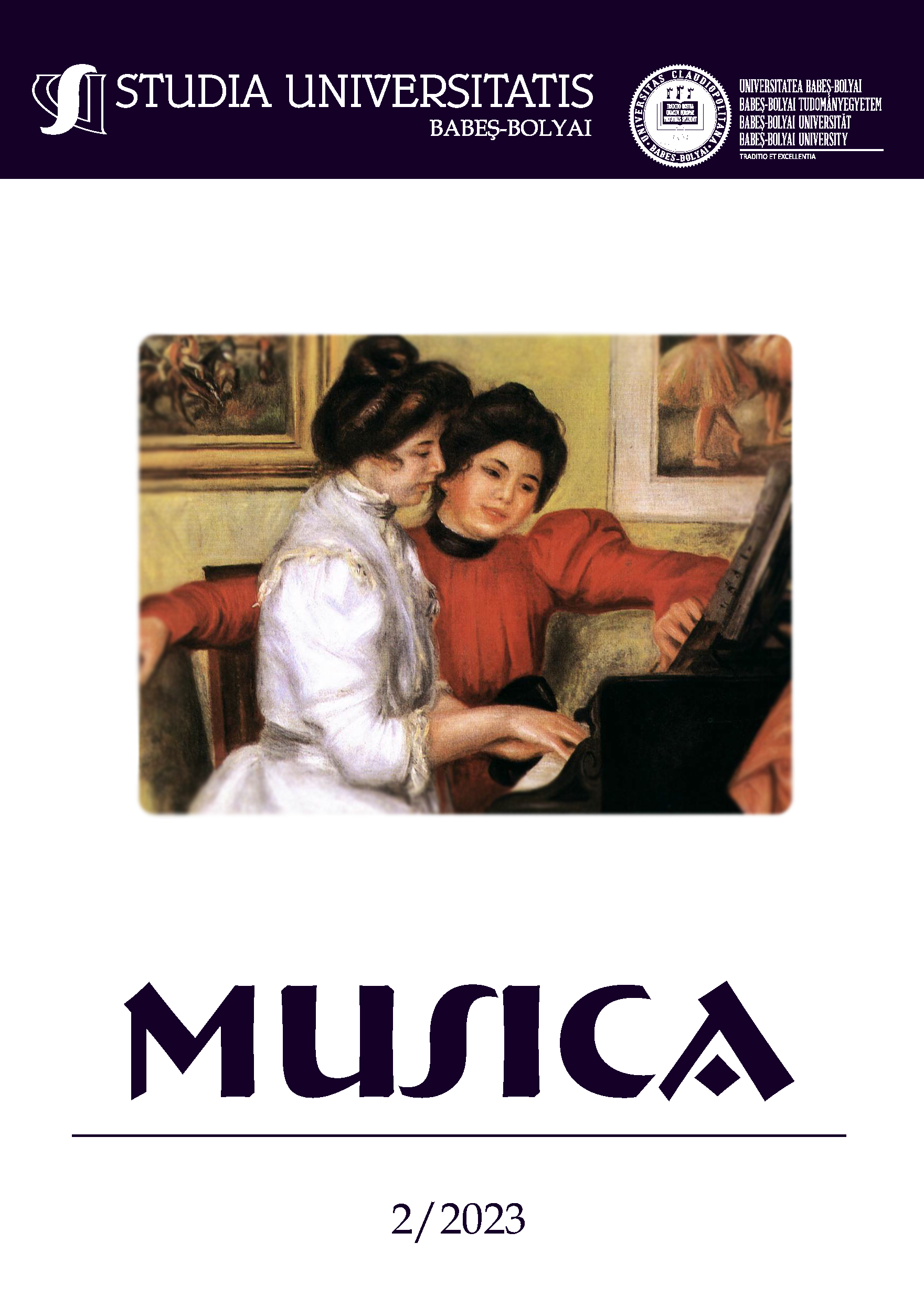At the Crossroads between Opera and Oratorio: Biblical Themes and 19ᵗʰ Century French Opera
DOI:
https://doi.org/10.24193/subbmusica.2023.2.02Keywords:
opera, oratorio, Bible, orientalism, fin de siècle.Abstract
The present study aims to investigate the delicate border between oratorios and operas based on biblical subjects, focusing on French music. A brief analysis of the period prior to the 19th century reveals that the oratorio was not one of the most popular genres in France, allowing the genesis of various genres inspired by biblical subjects. The oratorio enjoyed a brief revival in the 18th century, leading in the 19th century to the composition of biblical operas and the dawn of genres that are at the crossroads between opera and oratorio: mystére, drame sacré, or légende sacrée, represented by works of Jules Massenet. Although traditionally referred to as oratorios, these works allowed for staged representation, due to the dramatic qualities of the librettos, which in turn allowed for the musical discourse to depart from the sobriety of the oratorio and to include certain features that are characteristic for opera. Gradually, biblical subjects began to be tackled in operas as well, as will be seen in the works of Camille Saint-Saëns and Jules Massenet, the two composers on whose works the present study mainly focuses. At the same time, biblical themes can be related to musical orientalism, but also to the fin de siècle decadent aesthetic (through their exploration of such themes as the opposition between sacred and erotic love), serving as mirror for the political, social, and religious context of the Third Republic.
References
Bartoli, Jean-Pierre. 1997. L’orientalisme dans la musique française du XIXe siècle: la ponctuation, la seconde augmentée et l’apparition de la modalité dans les procédures exotiques in Revue belge de Musicologie (Belgisch Tijdschrift voor Muziekwetenschap), Vol. 51 (1997), pp. 137-170.
Branger, Jean-Christophe; Ramaut, Alban. Opéra et religion sous la IIIe République [actes du colloque des 10 et 11 novembre 2005 organisé dans le cadre du 8e Festival Massenet de l’Opéra Théâtre de Saint-Etienne]. Publications de l’Université de Saint-Étienne, Saint-Étienne, 2006.
Cère, Emile. L’Excommunication de Massenet in La France, 5 January 1886.
Dratwitcki, Benoît. Oratorio and opéra sacré in France (1700-1830): experimental genres?, from the CD-Book La Mort d’Abel de Kretezer, 2012. Available at: http://www.bruzanemediabase.com/eng/layout/set/print/Musical-scholarship-on-line/Articles/Dratwicki-Benoit-Oratorio-and-opera-sacre-in-France-1700-1830-experimental-genres (page accessed on 21 august 2023).
Hallays-Dabot, Victor. La Censure dramatique et le théâtre, histoire des vingt dernières années (1850-1870). Paris: E. Dentu, 1871.
Hervey, Arthur. Masters of French Music. London: Osgood, McIlvaine & Co., 1894.
Koechlin, Charles. Souvenirs de la classe Massenet (1894–1895) in Le ménestrel, 8 March 1935.
Lacombe, Hervé. The Keys to French Opera in the Nineteenth Century. Berkeley – Los Angeles: University of California Press, 2001.
Locke, Ralph P. Constructing the Oriental ‘Other’: Saint-Saëns’ “Samson et Dalila” in Cambridge Opera Journal, Vol. 3, No. 3, Nov. 1991, pp. 261-302.
McManners, John. Abbés and Actresses: The Church and the Theatrical Profession in Eighteenth-Century France. Oxford: Clarendon Press, 1982.
Meyer, Stephen C. Carl Maria von Weber and the Search for a German Opera. Indiana University Press, 2003.
Moreno, Henri. Semaine Théâtrale in Le Ménestrel, 52/6, Sunday, 10 January 1886, p. 42-43.
Rowden, Clair. Massenet, Marianne and Mary: Republican morality and Catholic tradition at the opera. Unpublished Doctoral thesis, City University London, 2001. Available at: http://openaccess.city.ac.uk/7611/ (page accessed on 9 September 2023).
Tschudi-Madsen, Stephane. Art Nouveau. București: Editura Meridiane [Bucharest: Meridiane Publishing House], 1977.
Walker, Jennifer. Church, State and an Operatic Outlaw: Jules Massenet’s Hérodiade in Cambridge Opera Journal, 2020, 31 (2-3), pp. 211–236.
Scores:
Massenet, Jules. Hérodiade (the four act French version of 1884). Paris: Heugel, 1893.
Massenet, Jules. Marie-Magdeleine. Paris: Heugel, 1893. Reissue: 1905.
Saint-Saëns, Camille. Samson et Dalila. Paris: Durand & Fils, 1895.
Downloads
Published
How to Cite
Issue
Section
License
Copyright (c) 2023 Studia Universitatis Babeș-Bolyai Musica

This work is licensed under a Creative Commons Attribution-NonCommercial-NoDerivatives 4.0 International License.



